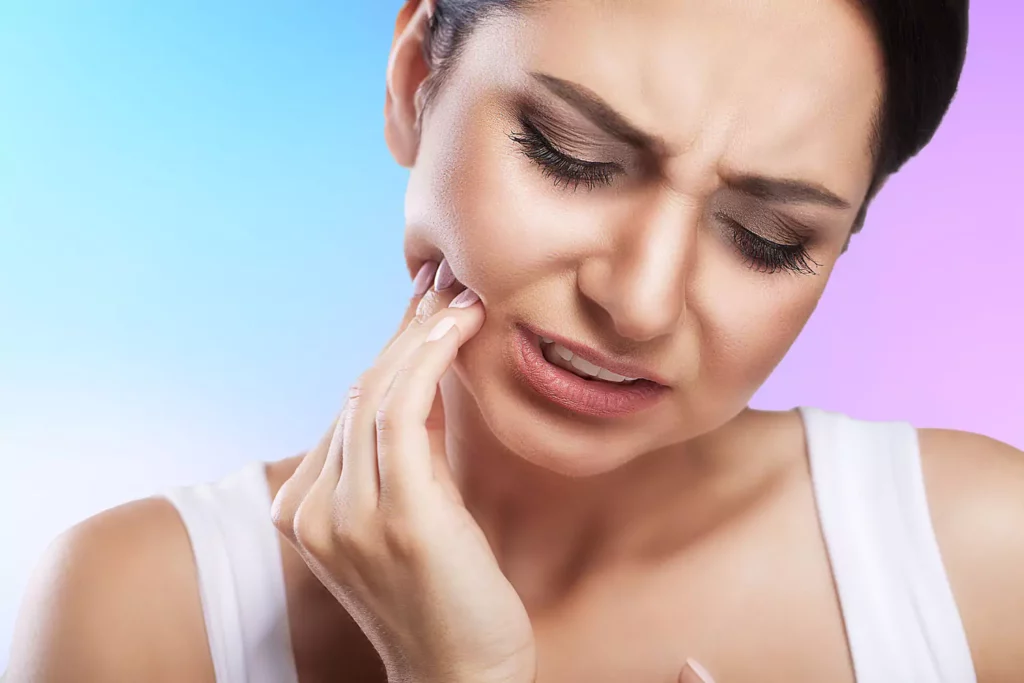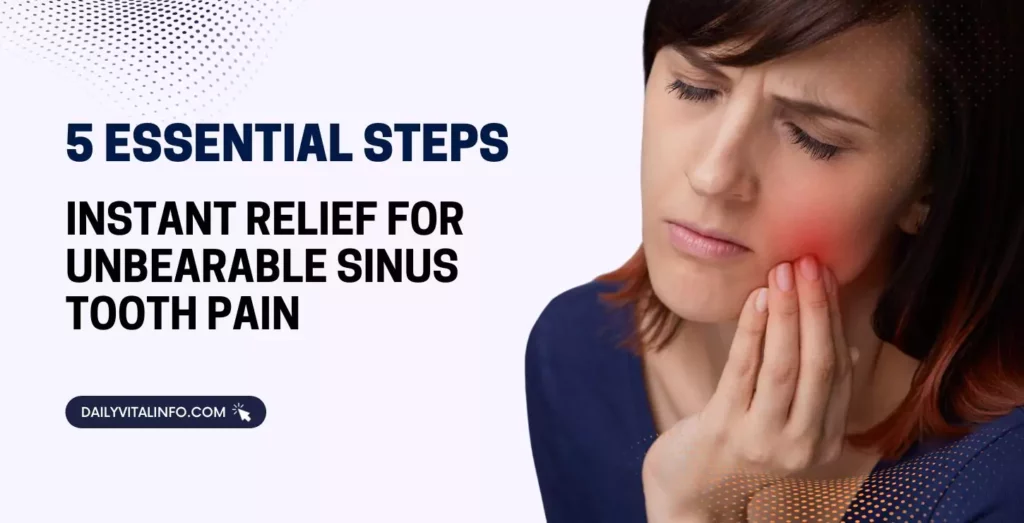Unbearable sinus tooth pain can be caused by sinusitis or a dental infection. This pain can be intense and debilitating, affecting your daily life and causing extreme discomfort.
It is essential to seek immediate medical attention to diagnose and treat the underlying cause of the pain. Ignoring the pain or attempting to self-medicate may lead to further complications and worsen the condition. Promptly addressing the issue can relieve the unbearable sinus tooth pain and improve your overall well-being.
We will explore the causes and symptoms of sinus tooth pain and the treatment options available to alleviate your discomfort.

1. Immediate pain management techniques
Discover immediate pain management techniques to alleviate unbearable sinus tooth pain. These techniques offer fast relief from discomfort and allow you to manage the pain better and effectively. Tooth pain caused by sinus pressure can be unbearable and disrupt your daily life. While seeking professional dental care to address the underlying issue is essential, some immediate pain management techniques can provide temporary relief.
Here are some methods you can try:
- Nasal irrigation: Use a saline solution to rinse your nasal passages and reduce congestion. This can help relieve sinus pressure, which may alleviate the tooth pain associated with it.
- Over-the-counter pain relievers: Non-prescription pain medications like ibuprofen or acetaminophen can help alleviate the discomfort caused by sinus tooth pain. Follow the recommended dosage instructions and consult your pharmacist for any concerns.
- Cold compress: Applying a cold compress to your face can help numb the area and temporarily relieve pain. Wrap an ice pack or a bag of frozen vegetables in a cloth and hold it against the affected side of your face for around 15 minutes.
- Moist heat therapy: Applying a warm compress or damp cloth to the affected area can help soothe discomfort and reduce sinus pressure. Please leave it in place for about 15 minutes and repeat as needed.
- Steam inhalation: Inhaling steam can help relieve sinus congestion and tooth pain. Fill a bowl with hot water, cover your head with a towel, and lean over the bowl while breathing deeply. Be cautious to avoid burns from the steam.
Remember, these pain management techniques are temporary solutions, not a substitute for professional dental or medical care. If your tooth pain persists or worsens, it is crucial to consult a healthcare professional. Take care of your oral health by maintaining regular dental check-ups and practicing good oral hygiene to prevent future tooth pain caused by sinus issues.
2. Saline nasal washes
Relieve unbearable sinus tooth pain with saline nasal washes, a natural and effective solution. Clear your sinuses and alleviate the discomfort caused by sinus-related toothaches. Saline nasal washes are a simple and effective solution for relieving unbearable sinus tooth pain. They work by irrigating the nasal passages, flushing out irritants, reducing inflammation, and promoting better drainage. By keeping the nasal passages clean, saline nasal washes can alleviate sinus pressure and alleviate the pain associated with sinus toothaches.
Here are some key benefits of using saline nasal washes:
- Clears nasal congestion: Saline solution helps to loosen mucus and clear nasal congestion, allowing for better airflow and relieving pressure on the sinuses.
- Reduces inflammation: The saline solution has a soothing effect on the nasal tissues, reducing inflammation and swelling that can contribute to sinus pain.
- Promotes sinus drainage: Saline nasal washes help to thin out mucus, making it easier for the sinuses to drain properly. This can prevent mucus buildup and alleviate sinus tooth pain.
- Hydrates the nasal passages: Dry nasal passages can exacerbate sinus pain. Saline nasal washes provide moisture to the passages, keeping them hydrated and reducing discomfort.
- Cleanses allergens and irritants: The saline solution effectively removes allergens, irritants, and bacteria that can contribute to sinus inflammation and pain.
To perform a saline nasal wash, follow these simple steps:
- Start by making a saline solution using sterile water and salt. Dissolve 1/4 to 1/2 teaspoon of non-iodized salt in 8 ounces of warm water. Ensure the water is distilled, boiled, and cooled to reduce the risk of contamination.
- Stand facing a sink and tilt your head forward slightly.
- Using a nasal rinse bottle or a neti pot, gently pour the saline solution into one nostril while keeping your mouth open.
- Allow the saline solution to flow through your nasal passages and the other nostrils. It’s normal for some solution to come out of your mouth.
- Blow your nose gently to remove any excess moisture and mucus.
- Repeat the process with the other nostril.
It’s important to note that using proper technique and sterile water is crucial to avoid potential complications. If you experience any discomfort or have a chronic sinus condition, it’s advisable to consult a healthcare professional before using saline nasal washes.
Incorporating saline nasal washes into your daily routine can relieve unbearable sinus tooth pain and improve your overall sinus health.
3. Elevation and rest
Elevation and rest can provide relief from the unbearable sinus tooth pain. By keeping your head elevated and taking time to rest, you can reduce pressure and inflammation in the sinuses, alleviating pain and discomfort.
Unbearable Sinus Tooth Pain:
Experiencing sinus tooth pain can be unbearable and disrupt your daily life. If you’re looking for effective ways to alleviate the discomfort, elevating your head and getting enough rest can offer relief. Here are a few reasons why elevation and rest are essential in managing sinus tooth pain:
Benefits Of Elevation:
- Elevation helps reduce pressure: When you elevate your head, whether by using an extra pillow or adjusting your sleeping position, it can help drain the sinuses and reduce pressure on your teeth and jaw.
- Improved blood circulation: Elevating your head promotes better blood circulation, which aids in reducing inflammation and flushing out toxins that might contribute to your sinus tooth pain.
- Eases congestion: Elevating your head improves mucus drainage, reducing nasal congestion and alleviating the pressure that can cause tooth pain.
Importance Of Sufficient Rest:
- Enhances the body’s healing process: Rest is vital for your body to repair and rejuvenate. When you give yourself enough time to rest, your immune system has a chance to recover and combat any underlying causes of sinus tooth pain, such as infections or inflammation.
- Reduces stress levels: Chronic tooth pain can affect your overall well-being. Adequate rest allows your body to relax, reducing stress hormones and promoting a sense of calm that can help manage sinus tooth pain more effectively.
- Promotes faster recovery: Resting and taking breaks throughout the day can speed up healing and alleviate sinus tooth pain. Giving your body the time it needs to heal is essential for a quicker recovery.
Remember to consult your healthcare professional if your sinus tooth pain persists or worsens. In addition to elevation and rest, they may recommend other treatments or remedies to address the underlying causes of your discomfort.
Implementing elevation and rest in your daily routine can go a long way in managing unbearable sinus tooth pain. Give your body the support it needs to heal and rejuvenate, and you’ll find relief from the discomfort caused by sinus pressure.
4. Hydration and diet
Proper hydration and a balanced diet can help alleviate unbearable sinus tooth pain. Staying hydrated flushes out toxins and promotes sinus health, while a diet rich in anti-inflammatory foods can reduce inflammation and pain.
Dealing with unbearable sinus tooth pain can be incredibly frustrating. Fortunately, there are simple yet effective ways to alleviate the discomfort and promote faster healing. One important aspect to consider is your hydration and diet. By making certain adjustments and choices, you can provide your body with the necessary nutrients and support it needs to recover.
Let’s explore some key points to remember:
- Stay Hydrated: Maintaining proper hydration levels helps to thin mucus and reduce congestion, providing relief to your sinus and tooth pain. Drink an adequate amount of water throughout the day, aiming for at least 8 glasses. Additionally, you can consume clear broths, herbal teas, and natural fruit juices to further hydrate your body.
- Reduce Inflammatory Foods: Certain foods can exacerbate inflammation, worsening your sinus tooth pain. Be mindful of the following culprits and try to limit or avoid them:
- Spicy foods: Capsaicin, present in spicy foods, can irritate your sinuses.
- Sugar: High sugar intake can trigger inflammation and weaken the immune system.
- Dairy products: Some individuals find that consuming dairy products increases mucus production, which can lead to more sinus congestion.
- Processed foods: These often contain additives and preservatives that may contribute to inflammation.
Opt for a diet that includes anti-inflammatory foods such as:
- Fruits: Berries, cherries, citrus fruits, and grapes are rich in antioxidants, which help combat inflammation.
- Vegetables: Leafy greens, broccoli, bell peppers, and tomatoes provide essential vitamins and minerals that support your immune system.
- Omega-3 fatty acids: Incorporate fatty fish like salmon or sardines, flaxseeds, and walnuts into your diet to reduce inflammation.
- Optimize Vitamin C Intake: Vitamin C plays a crucial role in maintaining the health of your teeth and gums. It also boosts your immune system, aiding in the healing process. Incorporate foods rich in vitamin C, such as oranges, strawberries, kiwi, and bell peppers, into your daily meals.
- Choose Foods with Natural Antibacterial Properties: Certain foods possess natural antibacterial properties, which can help manage sinus infections or prevent them from occurring. Consider adding the following to your diet:
- Garlic: Known for its antimicrobial properties, garlic can help fight infection.
- Turmeric: This vibrant spice contains curcumin, which has anti-inflammatory and antibacterial properties.
- Ginger: Ginger has antimicrobial properties that can help reduce pain and inflammation.
- Avoid Food Triggers: Different individuals may have specific food triggers that worsen their sinus tooth pain. Identify any food allergies or sensitivities you may have and avoid those foods to prevent further discomfort.
Remember, Hydration and a balanced diet can significantly contribute to alleviating your sinus tooth pain. By incorporating these dietary adjustments, you provide your body with the necessary tools for a faster and more comfortable recovery.
5. When to seek professional help
Experiencing unbearable sinus tooth pain? It may be time to seek professional help for immediate relief and proper treatment. Don’t let the pain linger – consult a specialist who can diagnose the underlying cause and provide effective solutions to alleviate your discomfort.
Experiencing unbearable sinus tooth pain can be extremely distressing and affect your daily activities. While some tooth pain may be temporary and manageable at home, there are instances where seeking professional help becomes necessary. Here are some signs and symptoms that indicate it’s time to consult a dental professional:
- Prolonged or intensifying pain: If the tooth pain persists for more than a couple of days and becomes increasingly severe, it’s crucial to seek professional guidance. This could be a sign of an underlying issue that requires diagnosis and treatment from a dentist.
- Swelling and inflammation: When pain is accompanied by noticeable swelling or redness around the affected tooth or gums, it may indicate an infection or other dental problem. Prompt dental intervention is essential to prevent the condition from worsening.
- Difficulty in eating and drinking: If your tooth pain interferes with your ability to eat or drink properly, it’s advisable to schedule an appointment with a dentist. They can assess the underlying cause and provide appropriate treatment options to alleviate your discomfort.
- Fever and fatigue: The presence of a fever and feeling unusually tired, alongside tooth pain, can suggest a more serious dental infection. In such cases, it’s vital to seek immediate professional attention to prevent the infection from spreading further.
- Sensitivity to temperature or pressure changes: Tooth pain that is triggered by hot or cold foods, beverages, or even a simple touch may indicate tooth decay or nerve damage. Consulting a dentist can help identify the source of sensitivity and provide appropriate treatment options.
Remember, persistent and unbearable sinus tooth pain should never be ignored. Seeking professional dental care at the right time can help alleviate your pain, prevent further complications, and ensure your oral health remains in good condition.
Preventative Measures
Prevent unbearable sinus tooth pain with effective preventative measures. Maintain good oral hygiene, avoid sinus infections, and seek timely dental care to alleviate discomfort and prevent complications.
Sinus tooth pain can be excruciating and disruptive to daily life. Thankfully, there are several preventative measures you can take to minimize the occurrence of this unbearable pain. By incorporating these practices into your routine, you can reduce the likelihood of experiencing sinus tooth pain and enjoy a healthier mouth and sinuses.
- Maintain good oral hygiene: Brush your teeth at least twice daily with a soft-bristled toothbrush and fluoride toothpaste. Don’t forget to floss daily to remove plaque and food particles between your teeth.
- Stay hydrated: Drinking adequate water daily helps keep your sinuses moist and prevents them from becoming congested. Aim for at least eight glasses of water daily.
- Avoid food triggers: Certain foods, such as spicy or acidic, can irritate your sinuses and trigger tooth pain. Limit your intake of these foods to reduce the likelihood of sinus-related discomfort.
- Manage allergies: If you suffer from allergies, managing them effectively is essential. Consult an allergist to identify your triggers and develop a treatment plan, including medication or allergy shots.
- Use a humidifier: Dry indoor air can exacerbate sinus pain. Invest in a humidifier to add moisture to the air, which helps keep your sinuses moist and reduces the chances of tooth pain.
- Avoid smoking: Smoking can irritate your sinuses and contribute to tooth pain. Quitting smoking improves your overall health and reduces the risk of sinus-related discomfort.
- Limit alcohol and caffeine: Alcohol and caffeinated beverages can dehydrate your body, including your sinuses. Limit your intake to prevent drying out sinuses and potentially triggering tooth pain.
- Maintain sinus health: Practice nasal irrigation using a saline solution to clear your sinuses and reduce the likelihood of them becoming congested. Additionally, consider using nasal sprays or decongestants as directed by your healthcare provider.
- Manage stress: High stress levels can weaken your immune system, making you more susceptible to sinus infections and related tooth pain. Explore stress management techniques like exercise, meditation, or hobbies that help you relax and unwind.
- Seek medical attention: If you frequently experience sinus tooth pain or have persistent symptoms, it is important to consult with a healthcare professional. They can help identify any underlying conditions and provide appropriate treatment options.
By incorporating these preventative measures into your daily routine, you can take proactive steps to minimize the occurrence of sinus tooth pain. Remember, maintaining good oral hygiene, managing allergies, staying hydrated, and seeking medical attention when necessary is vital for a healthy mouth and sinus cavity.
9 Proven Benefits of Cold Pressed Virgin Coconut Oil for Psoriasis Relief
Understanding The Sinus-tooth Connection
The unbearable pain caused by sinus toothaches can be better understood by exploring the sinus-tooth connection. By delving into this topic, you’ll gain insight into the link between sinus issues and tooth pain.
The pain caused by sinusitis can be unbearable, especially when it radiates to the teeth. The sinus-tooth connection refers to the relationship between the sinuses and the upper teeth, where sinus issues can lead to tooth pain. Understanding this connection is crucial for effectively managing and treating sinus tooth pain.
How Sinusitis Affects The Teeth:
- Sinusitis is an inflammation of the sinuses, which are air-filled spaces located behind the forehead, nose, and cheeks. When the sinuses become congested or infected, they can put pressure on the roots of the upper teeth, leading to tooth pain.
- The maxillary sinuses, which are located just above the upper jaw and near the cheekbones, are particularly close to the roots of the upper molars and premolars. Inflammation in these sinuses can transfer pain signals to the teeth.
- Sinusitis can also cause a condition known as referred pain. When the sinuses are inflamed, the nerves that supply both the sinus and tooth areas can become oversensitive. This can result in referred pain, where sinus pain is felt in the teeth.
Common Symptoms Of Sinus Tooth Pain:
- A dull or throbbing toothache in the upper teeth, often with no apparent dental cause.
- Worsened tooth pain when bending forward, coughing, or sneezing.
- Pain that is more widespread and cannot be pinpointed to a specific tooth.
- Pressure or fullness in the cheeks, forehead, or around the eyes.
- Nasal congestion or a runny nose.
- Facial tenderness or swelling.
Diagnosis And Treatment Options:
- It is essential to consult with a healthcare professional to determine the underlying cause of tooth pain. They will conduct a thorough examination and may recommend further tests or refer you to a specialist if necessary.
- In most cases, treating the sinusitis will alleviate the tooth pain. This may involve a combination of over-the-counter pain relievers, saline nasal rinses, decongestants, and prescribed antibiotics if the sinusitis is bacterial.
- Addressing the underlying cause of sinusitis can help prevent future episodes of sinus tooth pain. This may include managing allergies, avoiding irritants, and practicing good sinus hygiene, such as maintaining proper nasal irrigation.
It’s crucial to understand the sinus-tooth connection to effectively manage and treat sinus-tooth pain. By recognizing the symptoms and addressing the underlying cause of sinusitis, individuals can find relief from this unbearable pain. Remember to seek professional medical advice for an accurate diagnosis and personalized treatment plan.
FAQ:
How do I relieve sinus pressure in my teeth?
To relieve sinus pressure in your teeth, try nasal irrigation with saline solution, apply warm compresses to your face, take over-the-counter pain relievers, use decongestants, and stay hydrated. Also, avoid allergens and irritants, and consider using a humidifier in your home.
What is the home remedy for unbearable sinus tooth pain?
You can try a few home remedies to alleviate unbearable sinus tooth pain. Rinse your mouth with warm saltwater, apply a cold compress to your face, use over-the-counter pain relievers or decongestants, and try steam inhalation to relieve congestion.
What is the best painkiller for sinus toothache?
The best painkiller for sinus toothache is commonly over-the-counter drugs like ibuprofen or acetaminophen. These can help reduce the pain and inflammation associated with sinus toothaches. They should be taken according to the package instructions or a healthcare professional’s advice.
Can sinus pain in teeth be unbearable?
Yes, sinus pain in teeth can be excruciating.
Conclusion
To conclude, sinus tooth pain can be incredibly uncomfortable and disruptive to daily life. By understanding the causes and symptoms of this condition, as well as implementing proper dental hygiene and seeking professional treatment, you can alleviate the pain and prevent further complications.
Remember, taking care of your oral health is essential for overall well-being. Don’t let sinus tooth pain go untreated – seek the advice of a dentist or healthcare professional for personalized recommendations and relief.


